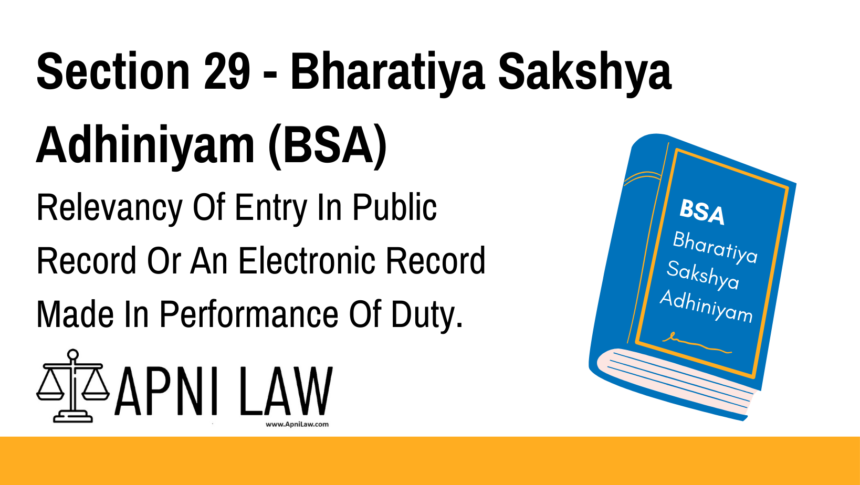Code
An entry in any public or other official book, register or record or an electronic
record, stating a fact in issue or relevant fact, and made by a public servant in the discharge
of his official duty, or by any other person in performance of a duty specially enjoined by
the law of the country in which such book, register or record or an electronic record, is kept,
is itself a relevant fact.
Explanation
Section 29 of the Bharatiya Sakshya Adhiniyam (BSA) establishes the evidentiary value of entries made in public or official records — including electronic records. The section emphasizes that such entries are considered relevant facts in judicial proceedings if the following conditions are met:
- The entry must state a fact in issue or a fact relevant to the case.
- It must be recorded in a public or official book, register, or record.
- The entry must be made by:
- A public servant in the discharge of his official duty, or
- Any other person performing a duty specifically mandated by law.
This section allows Courts to rely on official records without needing further verification, streamlining the evidentiary process in cases involving government documents.
Illustration
→ Example: A birth certificate issued by the municipal corporation contains an entry showing the date of birth of a person. Since the certificate is maintained by a public servant in the discharge of his official duty, and the entry is in a public register, it is a relevant fact under Section 29 BSA in any proceeding where the person’s age is in question.
→ Another Example: A land ownership record maintained by the revenue department, which shows X as the legal owner, is admissible as a relevant fact in a dispute over property ownership.
Common Questions and Answers
1. Are digital records like e-Birth Certificates or Aadhaar entries relevant under Section 29?
Yes. The section explicitly includes electronic records, making entries in legally maintained digital databases admissible in Court.
2. Is it necessary to bring the public servant who made the entry to Court?
Not always. Since the entry is in an official record maintained under legal obligation, it is presumed to be reliable and can be submitted without direct testimony, unless disputed.
3. Can records maintained by private entities be admissible under Section 29?
Only if the person maintaining the record is performing a duty “specially enjoined by the law of the country.” Purely private records without legal backing are not covered under this section.
4. What are some examples of public or official records?
Examples include:
- Birth and death registers
- Land and revenue records
- FIRs and police station diaries
- Electoral rolls
- Government employment registers
- Official gazettes
5. How is Section 29 different from Section 28 BSA?
Section 28 deals with entries in business account books (private), while Section 29 is about public or official records maintained under legal authority.
Conclusion
Section 29 of the Bharatiya Sakshya Adhiniyam underscores the importance and admissibility of official records as evidence in legal proceedings. By recognizing the trustworthiness of documents created in the discharge of lawful duties, it facilitates smooth judicial processes and reduces the burden of proof.
Looking to understand more about legal evidence in India? Visit ApniLaw for expert legal breakdowns and case-based explanations.








